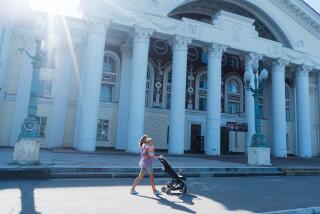Vermont Saying Goodby to Solzhenitsyn : Emigre: Townspeople in Cavendish agree they will miss the reclusive the Russian writer. After 17 years in exile, he is preparing to return to his homeland.
- Share via
CAVENDISH, Vt. — The sturdy sign beside the entrance to the Cavendish General Store is a measure of respect, Vermont-style, for this town’s renowned resident--Russian author Alexander Solzhenitsyn.
In small black lettering, it warns the ceaseless trickle of tourists, literature buffs and reporters not to bother even asking for the way to Solzhenitsyn’s wooded, hillside retreat three miles outside town.
Store owner Joe Allen said he lost count of how many times treasure hunters made off with his “No Directions to the Solzhenitsyn Home” display. So, a few years ago, he jammed it up against the wall with two 9-inch spikes.
Now that the Solzhenitsyn family is preparing to return to the motherland, the sign could serve as a difficult-to-remove reminder of Cavendish’s 17 years as a respectful host to a reclusive celebrity.
“I’ll miss the notoriety--I’m a famous person,” said Allen, chuckling. “This is my last hurrah.”
“They’re good neighbors,” he added. “I just hope I get to say goodby.”
Few of the 1,373 residents have come in direct contact with the Nobel Prize-winning author of “The Gulag Archipelago” since he settled in this Black River Valley town in southern Vermont in 1976, two years after Soviet leaders exiled him for his anti-communist writings.
But many of them are dogged defenders of the family’s privacy.
“This is the way Vermonters are,” said farmer Barry Stearns, who milks Holsteins on a farm around the bend from the Solzhenitsyn compound. “If you want to mingle, you mingle. If you don’t, you don’t.”
Although the Solzhenitsyns have not exactly been active in town affairs, it hasn’t been uncommon through the years to see Solzhenitsyn’s wife, Natalia, or her mother, Katerina Svetlova, stopping by the general store.
Solzhenitsyn himself attended a couple of town meetings and caused a minor stir in 1991 when he joined in Cavendish’s parade and celebration of the bicentennial of Vermont statehood.
Best-known to the townspeople are the couple’s children, Ignat, Stephan and Yermolay, who are now in college. They attended Cavendish’s public elementary school and a regional high school in nearby Chester and eagerly filled in their schoolmates on Russian culture.
“It was good for everybody,” said Sandra Stearns, whose daughter helped one of the boys--she can’t remember which one--on algebra homework.
In return, he helped her with other subjects and taught her some Russian. It was only natural that they turned out be swear words, Stearns recalled with a laugh.
The Solzhenitsyns will return home once construction is complete on their new brick house in the Troitse-Lykovo resort outside Moscow. Mrs. Solzhenitsyn is in Russia overseeing construction and working with the Russian Social Fund, which Solzhenitsyn founded from exile to help other political prisoners.
“It all depends on when (the house) is finished,” said Leonard DeLisio, who spends several days a week at the compound as Solzhenitsyn’s assistant. “It’s not like the United States. Some materials are not available.”
He said the Solzhenitsyns haven’t decided whether they’ll sell the Vermont house where Solzhenitsyn spends as much as 12 hours a day writing.
During his years here, Solzhenitsyn has written three multi-volume historical novels spanning World War I and the October, 1917, Communist revolution. Published in Russian, French and German, they have yet to be translated into English.
He is not working on any single topic at present. “He’s got all kinds of projects going,” DeLisio said.
More to Read
Sign up for Essential California
The most important California stories and recommendations in your inbox every morning.
You may occasionally receive promotional content from the Los Angeles Times.













